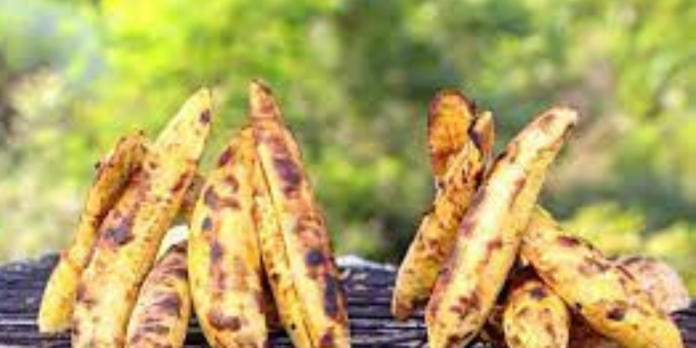Table of Contents
Boli : Nigeria’s vibrant street culture is a tapestry of diverse elements, each contributing to the rich and dynamic mosaic that defines the nation. Amidst the hustle and bustle of Nigerian streets, one culinary delight reigns supreme – Boli, the undisputed King of Nigerian roadside snacks. In this article, we delve into the origins, cultural significance, and culinary artistry that have crowned Boli as the monarch of street food in Nigeria.
In the heart of Nigeria’s bustling streets and quiet neighborhoods, a culinary tradition thrives that is as rich and varied as the nation itself. Among the myriad of roadside snacks, one stands out not only for its simplicity but for its profound cultural significance: Boli. This roasted plantain delight has been a favorite among Nigerians for generations, and in 2023, its popularity shows no signs of waning. This article invites you to explore the world of Boli, offering insights into its historical roots, cultural importance, and enduring appeal. Whether you are a seasoned foodie, a curious traveler, or someone interested in global cuisines, understanding Boli will deepen your appreciation for this quintessential Nigerian snack.
Why You Should Learn About Boli
In an era where culinary exploration often takes us to the far corners of the world through complex and exotic dishes, Boli stands as a testament to the beauty of simplicity. Learning about Boli is not just about discovering a new snack; it’s about appreciating how basic ingredients and traditional cooking methods can create something truly extraordinary. By delving into the story of Boli, you gain insights into Nigerian culture, history, and the everyday lives of its people.
Moreover, understanding it can enhance your culinary repertoire with a healthy, delicious, and easy-to-make snack. As global food trends shift towards more natural and wholesome eating, it offers a perfect example of how traditional foods can align with modern dietary preferences. For food enthusiasts, learning about it is an opportunity to explore new flavors and cooking techniques that are both accessible and deeply rooted in cultural heritage.
Why People Have Sought to Learn About it
Boli’s allure extends beyond its taste; it is a window into Nigerian life and identity. Over the years, both locals and international visitors have sought to learn about Boli for various reasons. For Nigerians, Boli is a nostalgic reminder of home, a comfort food that brings back memories of childhood, family gatherings, and communal living. For expatriates and tourists, it offers an authentic taste of Nigeria, a way to connect with the culture and traditions of the places they visit.
Academics and food historians are also drawn to Boli for its rich historical and cultural significance. Studying it provides a lens through which to examine broader themes in Nigerian society, such as agricultural practices, trade, and the evolution of street food culture. Chefs and culinary enthusiasts explore Boli to inspire new creations, blending traditional flavors with contemporary culinary techniques.
The simplicity of Boli belies its complexity as a cultural artifact. It represents resilience, adaptability, and the ingenuity of transforming a humble plantain into a beloved snack. People who learn about Boli do so not just to enjoy its flavor, but to understand the context in which it exists and thrives.
How This Write-Up Will Make Understanding Easier
This article is designed to be a comprehensive guide that simplifies the learning process, making it easier for you to understand and appreciate it. It is structured to take you on a journey from the basics to the more intricate details of this iconic snack.
The Birth:

The journey from a simple snack to the throne of Nigerian roadside cuisine is a fascinating tale deeply rooted in the country’s culinary history. Originating from the energetic streets, Boli began as a humble grilled plantain on a stick, seasoned with a blend of local spices. The simplicity of its inception belies the complex flavors and cultural resonance that would later define its culinary empire.
Culinary Alchemy: The Making of Boli:
At its core, Boli is a culinary masterpiece, showcasing the artistry of Nigerian street vendors. The process begins with carefully selecting ripe plantains, whose natural sweetness forms the foundation of it’s delectable taste. The plantains are then expertly grilled over an open flame, imparting a smoky flavor that distinguishes It from other snacks.
What elevates it to royal status is the meticulous seasoning. Vendors often have secret spice blends passed down through generations, adding a unique and tantalizing flavor profile to each skewer of grilled plantain. The result is a harmonious marriage of sweetness, smokiness, and a medley of spices that dance on the taste buds.
Cultural Significance:
Beyond its culinary prowess, It holds a special place in Nigerian culture. It transcends the boundaries of mere sustenance, embodying a communal experience shared by people from all walks of life. The aroma of grilling plantains wafting through the air is a nostalgic symphony that resonates with both locals and visitors alike.
It’s popularity is not confined to a specific demographic; it caters to the young and old, the rich and the humble. Its affordability makes it a snack of choice for many, fostering a sense of unity as people gather around roadside vendors to savor this culinary delight. Boli, in its essence, is a unifying force, connecting people through a shared love for a simple yet extraordinary snack.
The Linguistic Symphony of Boli:

In the midst of Nigeria’s linguistic diversity, it emerges as a cultural ambassador. Its name echoes through various Nigerian languages, each imbuing the snack with a unique linguistic charm. Whether it’s called “Boli” in Yoruba, “Boli” in Igbo, or “Boli” in Hausa, the name resonates with familiarity, creating a linguistic unity reflective of the snack’s ability to bring people together.
Variations Across Regions:
While Boli’s core ingredients remain consistent, regional variations add a kaleidoscopic touch to this street food sovereign. In the bustling streets of Lagos, vendors might offer a spicy pepper sauce to accompany it, while in the northern regions, it could be paired with a tangy tamarind dip. These regional nuances showcase the adaptability of it, transforming it into a versatile snack that embraces the diverse tastes of Nigeria.
Boli in the Digital Age:
In recent years, Boli has not only maintained its status as the King of Nigerian roadside snacks but has also expanded its kingdom into the digital realm. Social media platforms are adorned with images and videos of sizzling Boli, capturing the attention of food enthusiasts and inspiring culinary creativity. Online communities share Boli recipes, creating a virtual space where the love for this iconic snack transcends physical boundaries.
The Economic Impact:
Beyond its cultural and culinary significance, It plays a crucial role in the economic landscape of Nigerian street vendors. For many, selling It is not just a means of livelihood but a testament to the entrepreneurial spirit ingrained in Nigeria’s street culture. The modest setup of a Boli stand can become a thriving business, supporting families and contributing to the economic vitality of local communities.
Challenges Faced:
However, the journey to Boli’s royal status is not without its challenges. Street vendors often navigate through regulatory hurdles, facing issues such as licensing and sanitation concerns. Despite these obstacles, the resilience of vendors is a testament to the enduring popularity of this beloved snack and its integral role in the fabric of Nigerian street life.
Boli: A Culinary Diplomat:
As Nigeria continues to evolve, Boli remains a constant, a culinary diplomat that bridges gaps and fosters connections. Its enduring popularity speaks to more than just a preference for grilled plantains; it speaks to the resilience of tradition, the adaptability of culture, and the unifying power of shared experiences.
In the hustle and bustle of Nigerian streets, where the rhythm of life beats to its unique cadence, It stands tall as the King of roadside snacks. Its journey from a humble grilled plantain to a cultural icon reflects the essence of Nigeria’s street culture – dynamic, flavorful, and unapologetically vibrant. As it continues to reign supreme, it not only tantalizes taste buds but also weaves a narrative of unity, resilience, and the timeless art of bringing people together through the simple joy of a skewer of perfectly grilled plantains. Long live the King – , the culinary monarch of Nigerian roadside snacks.





















